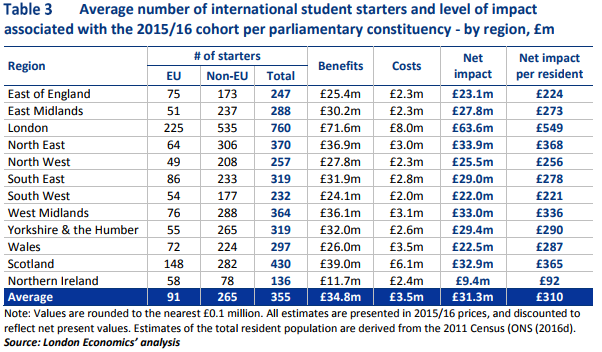A report, published yesterday by the Higher Education Policy Institute and Kaplan International Pathways, looked at both the benefits and the costs of hosting international students.
It found benefits, after accounting for costs, totalled £20.3bn for students commencing their studies in 2015-16, equivalent to £310 per UK resident.
The report comes amid an ongoing debate about whether international students should be included in UK immigration figures, as they currently are.
Nick Hillman, director of Higher Education Policy Institute, said: “Trying to persuade the Home Office that international students nearly always benefit the UK can feel like banging one’s head against a brick wall.
“In the past, they have not accepted figures on the benefits on the grounds that they ignore the costs. Our work, in contrast, includes all the potential costs and conclusively proves these are small compared to the huge benefits.”
The public costs of hosting international students, including healthcare, education received by dependent children, social security, public order and safety and defence, amount to £2.3bn.
But this compares to £22.64bn in economic benefits generated by international students such as tuition fee income and spending by both students resident in the UK and visiting family and friends. Of this amount, £17.5bn comes from non-EU students.
Alistair Jarvis, chief executive of Universities UK, said the study showed students made a “vital net contribution” to the UK.
“It is clear that this positive impact extends to university towns and cities in all corners of the UK. It is estimated that international students support over 200,000 jobs in communities across the UK,” he said.
On average, international students make a £31.3m net economic contribution to the economy for each of the 650 constituencies, the study said. This is equivalent to an average of £310 per member of the population, but varies from £549 in London to £92 in Northern Ireland.
At the top of this list, Sheffield Central had a net impact of £226m from the cohort of 2015-16 international students, equivalent to £1,960 per resident.
This was followed by Newcastle upon Tyne East at £192m, Nottingham South at £118m, Oxford East at £179m and Manchester Central at £170m.
Gavan Conlon, partner at London Economics who worked on the report, said that even though some constituencies may not benefit as much as others, the economic impact was “still positive”.
Even the lowest ranked constituency, in terms of net impact, Na h-Eileanan An Iar, benefited from a net contribution associated with international students of £3.6m.
According to the Higher Education Statistics Agency 231,065 international students started their studies in the UK in 2015-16. Of those, 58,960 (26%) were EU students and 172,105 (74%) came from outside the EU.
The study did not look at the costs and benefits students may make after they leave university, such as tax contributions and benefit claims.












